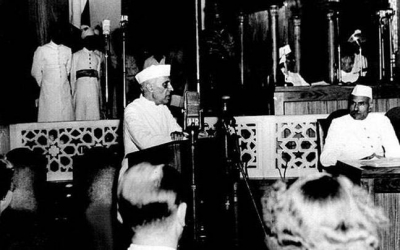
“Tryst with Destiny” was a speech(in english) delivered by Jawaharlal Nehru, the first Prime Minister of independent India, to the Indian Constituent Assembly in the Parliament, on the eve of India’s Independence, towards midnight on 14 August 1947. It spoke on the aspects that transcend India’s history. It is considered to be one of the greatest speeches of the 20th century[1] and to be a landmark oration that captures the essence of the triumphant culmination of the Indian independence struggle against the British Empire in India.
Unlike the prime ministers who came after him, Nehru was generally disinclined towards the idea of his speeches being written by someone else. Though he was compelled to take help in his speeches in his long tenure as prime minister, especially while delivering to a foreign audience (every turn of phrase counts in international relations), many of the speeches were his own.
Nehru’s private secretary MO Mathai would complain that the PM spent too much time “in dictating letters and drafting or dictating statements and speeches”.
The ‘Tryst with destiny’ speech was signature Nehru, crafted by his own hands.
The first prime minister also liked to speak extempore. Another one of his famous speeches – the ‘Light has gone out’ broadcast to the nation on radio when Mahatma Gandhi was assassinated – was extempore.
While this was perhaps the more heartfelt speech given the sadness that had descended on the nation, ‘Tryst with destiny’ has the power to speak directly to us after all these decades.
Picture Credit : Google




